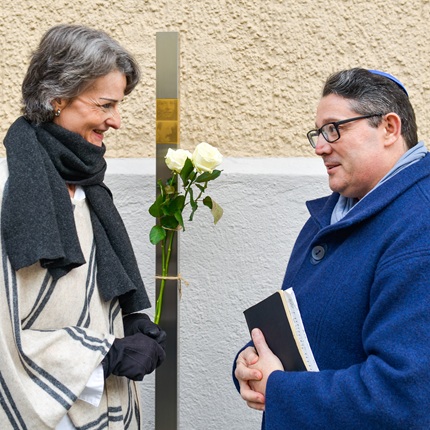Martin Mojzesz Moritz Hallerz was born on December 9, 1877 in Tarnów, today in Poland. In 1905 he married Regina Riwka Malka Anker. Together they ran a decorative painting business, which they opened in 1906 at Landwehrstraße 21 in Munich. Their four children were born between 1906 and 1910: Hermann, Frida, Albert and Berta.
On August 1, 1914, the first day of mobilization for World War I, Martin Hallerz was drafted. On September 6, 1914 he was captured and held as a Russian prisoner of war. Nearly six years passed before he was released, on June 19, 1920. The family then moved to Anglerstraße 9 in Munich’s Westend district. On October 28, 1938, during the “Polish Action,” Martin Hallerz and his wife, Regina, were imprisoned together with their two sons. They and other Jews who had emigrated from Poland were to be deported back. But when the Polish border authorities refused to allow them entry, their train was sent back to Munich. The family was free again. Soon afterward, on December 30, 1938, Martin Hallerz had to deregister his business in keeping with the decree for the "Elimination of the Jews from the Economic Life of Germany" („Ausschaltung der Juden aus dem deutschen Wirtschaftsleben“). The family therefore lost its livelihood and had to live on their savings.
After the start of World War II, on September 9, 1939, the Gestapo took Martin Hallerz into "protective custody" as a Polish Jew. He was forced to perform extremely hard labor in the notorious quarry at the Buchenwald concentration camp. At the age of 64, Martin Hallerz had reached the end of his strength. On March 11, 1942 the SS deported him to the Bernburg killing site along with 89 other prisoners deemed unfit to work, as part of „Aktion 14f13“. The SS murdered him in the gas chamber there, on the day of his arrival. His wife, Regina, was shot on November 25, 1941 in Kaunas, Lithuania. All four children survived the Nazi period, either because they had been able to flee in time, or because they were married to so-called “Aryans”. (text Ruth and Klaus Peter Münch, editor C. Fritsche, translation C. Hales)



-Hallerz_portrait.jpg/jcr:content/PORTRAIT_14384.jpg)


-Hallerz_image.jpg/jcr:content/EZ_BILD_14561.jpg)